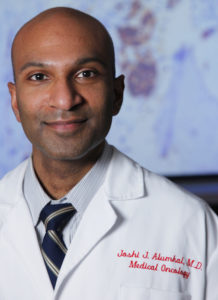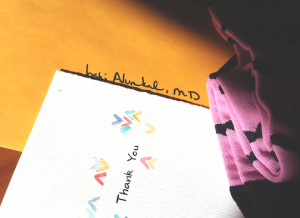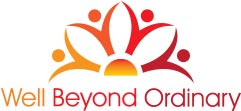
Dr. Joshi Alumkal
Cancer has been a part of my life since 1998 when my late husband was first diagnosed. My relationship with cancer is a multi-dimensional one that has given me both the worst and the best moments. It has touched me as a wife, caregiver, coach, fundraiser, patient/caregiver advocate, and friend. It changed everything for me, even though I wasn’t the one who was diagnosed. Even now as I move from coaching cancer survivorship into focusing on improving patient adherence in healthcare and high performance/wellbeing for healthcare professionals, it continues to inform who I am and how I live my life.
In all of these years and through all the different connections I have had with cancer, until recently, it remained a word. Six letters. A capital “C”. A word that I’ve long blamed for stealing the life I was supposed to lead. A word that sends fear through the strongest person and changes the trajectory of many lives.
I say until recently because this year I had the great fortune to attend an information session with Dr. Joshi Alumkal, an amazing physician-scientist focusing on prostate cancer at Oregon Health & Science University as part of my training for the volunteer role I fill as a Scientific Research Advisor for Knight Cancer Institute.
In less than an hour, Dr. Alumkal took extremely complex medical and scientific information and not only helped us to understand the most recent work being done in prostate cancer research but for me, for the first time since 1998, he made Cancer more than just a scary word.
Dr. Alumkal painted a picture of cancer that helped me to see it in a new light – as a complex organism that is wily, cunning, and intelligent. In that moment, for the first time, my hope that someday we would not only find better treatments but also be able to cure cancer, transformed into being truly possible. Because, the way I heard Dr. Alumkal tell the story of cancer made me see it as a living organism – and no living organism is perfect. Every organism on this planet has flaws. To me, that means there are codes that can be cracked and weaknesses that can be used in our favor to eventually take the win over cancer.
Q: Dr. Alumkal, as I shared with you after your presentation, how you see cancer and how you talk about it helped me to see real possibility for eventually finding a cure. I know it’s hard not to feel it’s not happening fast enough when someone is going through it right now, but can you please share what you see the possibility is for the future with regard to the work you are doing now?
A: What gives me hope is how much acceleration there has been in our understanding of what is wrong in cancer in patients and how we can harness that knowledge to improve treatments. It took 70 years of trying to develop the first drug for prostate cancer that worked better than just lower levels of male hormones – the principal way we treat the disease when it spreads – but in a matter of less than a decade, five new life-extending treatments have been developed for prostate cancer. We’ve never had a better understanding of what’s wrong in an individual’s cancer than we do right now. One of the things driving the acceleration is the technology we have available today to not only obtain patient tumor samples but also to deeply measure what is wrong in a cancer cell. It used to cost billions of dollars to understand the DNA code in a sample but now we can do that same experiment for several thousand dollars.
Q: What kind of impact do you feel being able to paint the picture of cancer in a way that non-medical professionals like me are able to understand the basics of the work you’re doing, the passion you have for your work, and the ability to see cancer as something we can eventually outsmart has?
A: As a physician-scientist, I’m fortunate to see patients and to do clinical and laboratory research. In the course of visiting with my patients, I do my best to give the patent the perspective of what the diagnosis means. There is certain answers we can provide, but I also share that many unanswered questions remain that still need researching. My goal is to help them understand we’ve made tremendous progress and that we must continue to ask important unanswered questions.
We need cannot make progress without the help of our patients. They are important partners in the clinical trial process to help us one day overcome cancer. Ultimately, it is through the teamwork of providers, researchers, and patients that all the fundamental discoveries have come about. Every drug that is now approved was once in a clinical trial, and it is the patients who participate in clinical trials―more than anyone else―who help get new cancer drug approved.
I am truly blown away by the altruism of patients that go through things that participate in research to increase our understanding even though they realize they, themselves, that may not directly benefit from the research improve their outcome but will help others. They are willing to offer samples from their body, to give their time, and to be drug testing pioneers at their worst time often when the stakes are highest―their cancer is starting to grow. When cancer was starting to grow again, when they were feeling ill, perhaps in the most pain they’ve every experienced, and when their treatment has stopped working…these are the moments during which they willingly offer to go through even more so we can continue improve treatments and outcomes.
Q: Because of the work you do, cancer is part of your life every day. What about that is challenging? How do you deal with those challenges so you can avoid burnout, which is so common in healthcare, and keep up your amazing work?
A: It has never been a more challenging time to be a cancer researcher and oncologist. There is so much information to keep track of with patientsabout cancer treatment. There are so many important ongoing, research questions, too. and other current research to make sure one feels one is as aware as possible about all that is going on. At the same time, the delivery of care to patients has become far more challenging due to the incredible amount of paperwork and regulations involved in patient care and research. Meanwhile, the research environment is increasingly cumbersome due to shrinking research dollars. It is easy to get overwhelemed or discouraged.
Even if this the picture I am painting may seems bleak, I and most everyone I know involved in cancer care or research we would n’t not trade what we do for any other job. This is because most us who go into the field of cancer do so because we want to be part of solving one of the most significant problems of our society. There are fewer higher callings than helping to reduce death and suffering from cancer. The possibility of making cancer a thing of the past keeps us going.
Certainly there are challenges such as losing patients, hitting funding roadblocks, hitting dead ends with our research, but so it is important to keep things in perspective. We can do this by being grateful for what we have in our life. We can lean on our families and other researcherscolleagues for comfort and support. It is important for us to recognize that this is a shared experience. It is not just about you and what you are going through, whether it is a breakthrough or a challenge you are facing; it is being shared by other people in your community of peers. Having this peer community you trust and who understand where you’re coming from is key. Going through oncology training is like military training for the Marines. You are immersed in the trenches together. Even though I only see some of my dearest friends from those early oncology training years once a year, they really understand who I am and what I’m going through. and we We have a shared history we can draw on for support.
Q: How does the hyphenate of being a physician-scientist help you in the work you do?
A: Some days it is challenging to do both, but in many ways it makes the work much more rewarding. To be able to have privilege to care for patients, try to understand what is wrong with cancer in patients, and then bring back those experiences and questions to the lab is amazing. Such a perspective allows you to get to the heart of clinical dilemmas we face in treating patients with cancer. We can then ask questions in lab to help overcome those hurdles. Being a physician-scientist gives one a unique perspective that provides a tremendous bird’s eye view of where we want to go. Dr. Brian Druker, the director of OHSU’s Knight Cancer Institute and one of the most revolutionary figures in modern cancer research, to this day continues to see patients because he realizes that caring for people helps him identify the critically important remaining questions that he then asks in the lab.
Q: For a wide range of reasons, there can be misperceptions in patient/caregiver communities and with the general public about the motivations of healthcare organizations, researchers, or pharmaceutical companies. It’s common to hear “cancer is big business”, yet I have personally met hundreds of researchers over the past several years who seem to be truly dedicated and committed to improving treatments and finding cures for this highly complex disease. From your perspective of someone who works with research in this area, what would you share to dispel some of the myths and misperceptions we commonly hear bandied about?
A: For people who are involved in cancer research, many of them could have taken a much more lucrative path in medicine and only exclusively focus on patient care instead of going into academic research. What draws us to research is that there is the opportunity to increase our understanding of what makes cancer tick, develop new treatments that are better, and improve outcomes. Drug companies have the same goal – to help patients live longer and better. They want to help create treatments that will be prescribed by physicians. If they are successful in that, they are profitable. And, if that is the case, then that means the patient is also experiencing the success! Pharma are critical partners in improving patient care as without them, academic institutions could not afford to do clinical research and patients wouldn’t benefit from advances we can make when everyone works together toward the same end.
Historically, pharmaceutical companies worked in isolation to develop treatments in animal models and then would approach us and ask us to test this in our patients. This model failed as they learned they couldn’t successfully develop treatments in isolation. Now, we’re able to bring our expertise in caring for patients to the process. It’s much more synergistic and our pharmaceutical partners make it possible to move drugs from the laboratory to clinical trials and hopefully new drug approvals. Without that ecosystem we won’t be able to make further progress.
Q: What called you to do this kind of work?
A: In training to become a physician, I had the good fortune to meet a lot of cancer patients. While there were other interesting diseases, I didn’t find anything to be as compelling as cancer. The word I use when I think of cancer is epic. It has wreaked incredible havoc and taken countless lives. It is a disease of our own cells, where our bodies turn against itself. It is the ultimate philosophical conundrum―how do we kill a part of a person (his or her tumor) without harming the person. I don’t know of any nobler calling because of how complicated the problem is and because of the damage that cancer causes. Whether a cancer researcher is touched personally by cancer or not, it is hard not to be touched by cancer patients one meets along the way. It is important to do all we can to reduce the suffering of cancer.
Q: In what ways does helping others impact your life?
A: I am blown away with every patient visit. Consistently, the last thing they a patient says to me as I am about to leave the room is thank you―, no matter what the news is…good or bad. I am involved intimately in their care, which allows me to see their courage and strength. This helps puts one’s own problems in perspective. There is no day I am more grateful than Tuesday afternoons, my day clinical day, after I finish caring for themmy patients. To care for thembe an oncologist is an honor that also reminds me how fortunate I am. It is a reminder that our health and life are ‘until further notice,’ and nothing is guaranteed.
Dr. Alumkal, thank you for taking time to share your insights and thoughts with us. Your work is a great contribution. Taking time to also help educate laypeople like me so we can enthusiastically continue to support researchers is very appreciated.
There are a number of ways to support research including becoming educated about clinical trials needing patients, donating to research, and volunteering as a grant reviewer, a position that is becoming more of a required component of the grant process. To read more about Dr. Alumkal, his team, and their research, click here.
 We wish Dr. Alumkal well in his research and look forward to celebrating when he cracks the code and take cancer to its knees.
We wish Dr. Alumkal well in his research and look forward to celebrating when he cracks the code and take cancer to its knees.
As a thank you to Dr. Alumkal, he was sent a pair of #pinksocks and is now considered a member of the #pinksocks tribe. This outstanding group of individuals working in healthcare is connected globally through these cannot be missed awesome socks and through the compassionate care, innovative thinking, and leadership they bring to the world. Click here to read more about PinksocksLife.
UPDATE: In of 2019, Dr. Alumkal, accepted a position Leader of the Prostate/Genitourinary Medical Oncology Section and Associate Division Chief for Basic Research in the Hematology-Oncology Division and Professor with tenure in the Department of Internal Medicine at the Rogul Cancer Institute in Michigan. We wish you all the best!

